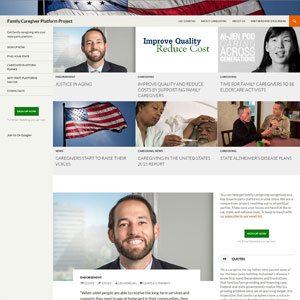Family Caregiver Platform Project: Making Caregivers Matter in Every State
December 10, 2015
Family Caregiver Alliance (FCA), which is mission-driven to improve the quality of life for caregivers and those they care for through information, services, and advocacy, is a proud Family Caregiver Platform Project (FCPP) national partner. As such, today’s (12/10) blog post feature is meant to announce FCPP’s activities and how others can assist getting family caregiving recognized as a key issue in all state party platforms. These announcements are in line with FCA’s National Center on Caregiving (NCC) program that serves as a central source of information on caregiving and long-term care issues for policy makers, service providers, media, funders, and family caregivers throughout the country.
Also, NCC publishes Caregiving Policy Digest, an e-newsletter that offers a fresh perspective on the rapidly changing world of caregiving policy. You can receive briefings on key legislation, news on innovative public programs, and the latest information on caregiving and long-term care policy at both the state and federal levels via subscription here.
— Angel Venegas, Program and Policy Specialist, FCA’s National Center on Caregiving
Making Caregivers Matter in Every State: Together, We Can Do This
Family Caregiver Platform Project (FCPP)
 Providing support to an ill or disabled loved one–caregiving–is a universal human experience, and nearly all of us will find ourselves needing care at some point in our life, especially as we live longer. Tens of millions of Americans step up to do this every year; many are employed, and some sacrifice their jobs to provide uncompensated care because there is simply no one else to do the job. Yet caregiving isn’t a subject that is often talked about by many politicians or at the high levels of government. We need to change that, starting now.
Providing support to an ill or disabled loved one–caregiving–is a universal human experience, and nearly all of us will find ourselves needing care at some point in our life, especially as we live longer. Tens of millions of Americans step up to do this every year; many are employed, and some sacrifice their jobs to provide uncompensated care because there is simply no one else to do the job. Yet caregiving isn’t a subject that is often talked about by many politicians or at the high levels of government. We need to change that, starting now.
There is no better time to engage policy-minded experts and politicians than in the midst of an exciting election-year campaign. Much is being debated, discussed, and considered. Caregivers have points of view, experiences to share, and ideas for improvement. That is the goal and mission of the nonpartisan Family Caregiver Platform Project (FCPP).
The following describes how the FCPP works:
Currently, we are actively working in 19 states across the country! In four states, we have submitted platform resolutions (sometimes called planks) that explain what tangible policies would help reduce the difficulties that can accompany unsupported caregiving. We work with energetic volunteers and both parties in each state. We help train volunteers to become effective advocates in speaking up for their own interests, and we work towards helping the parties see it is in their interest to consider adopting language as part of their deliberations to create state party platforms supporting caregivers. Many states will start the process of creating platform documents in January 2016, and this will continue through mid-2016. It’s going to be exciting, and we will continue to work with volunteers throughout this time. We would like to powerfully impact ALL caregivers across the country by influencing discussions at the state and national policy level during this campaign season.
Please join us! What we want are your ideas, your connections, your energy. As a volunteer, you can author submissions to your state’s political party. You can attend meetings, and get to know people who are helping to shape policy in your state. You can recruit other volunteers to attend local meetings, and network with those you know–and those you get to know–about the salience of caregiving issues to the fabric of society.
The FCPP has staff that can provide you with template submission downloads that can be readily tailored to the interests of the political party that you belong to, to local interests, and then be submitted to the Platform Committee in your state. These planks encourage support for caregivers through expanded medical training and education that incorporates the interests of family caregivers; improvement of care coordination in our health and community systems so that caregivers are recognized and included; expansion of caregiver support groups; ways to address the higher out-of-pocket costs associated with caregiving; and how to encourage more employer support of family caregivers in the workplace.
Putting caregivers into state platforms will solidify the values that indicate that family caregiving is an honorable thing to do. If every state and every community can point to how they support caregivers, we will create a kinder, more caring society that helps us all when we are ill, disabled, and old.
To find out how you can get started, visit the following Family Caregiver Platform Project website: caregivercorps.org.
Additionally, you can email us and follow the FCPP on Twitter.
— Elizabeth Rolf, Graduate Intern, Center for Eldercare and Advanced Illness, Altarum Institute
